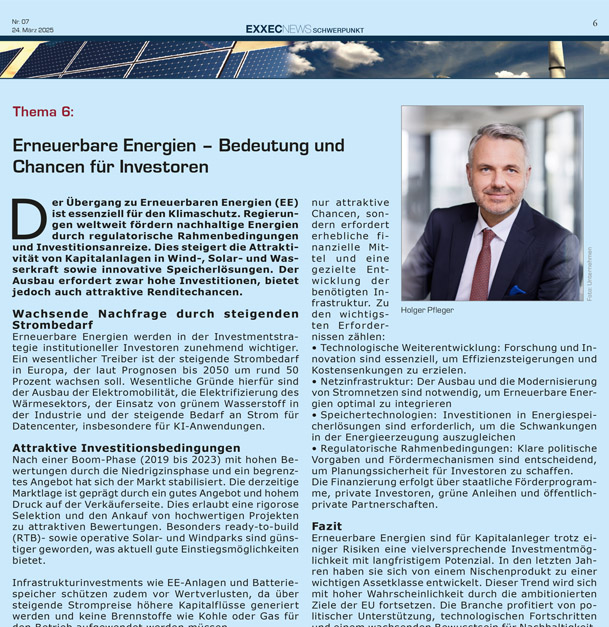In the current issue of EXXECNEWS (March 2025), Holger Pfleger, managing director of FOM Invest GmbH, highlights the opportunities and developments in the field of renewable energies as a capital investment. In his article, he highlights how the increasing demand for electricity, technological advances and attractive market conditions are opening up new opportunities for investors. Despite existing challenges, the asset class offers long-term stable income opportunities and contributes to the sustainable transformation of the energy supply – an issue of growing relevance for institutional investors.
Read the full article in ExxecNews (Geman): https://exxecnews.org/wp-content/uploads/2025/03/07-2025-Schwerpunkt.pdf
Translated text:
Renewable Energies – Importance and Opportunities for Investors
The transition to renewable energies (RE) is essential for climate protection. Governments around the world are promoting sustainable energy through regulatory frameworks and investment incentives. This increases the attractiveness of capital investments in wind, solar, and hydropower, as well as in innovative storage solutions. Although the expansion requires high investments, it also offers attractive return opportunities.
Growing demand due to rising electricity needs
Renewable energies are becoming increasingly important in the investment strategies of institutional investors. A key driver is the growing electricity demand in Europe, which is expected to rise by around 50 percent by 2050. Main reasons include the expansion of electromobility, electrification of the heating sector, the use of green hydrogen in industry, and the growing need for electricity for data centers—especially for AI applications.
Attractive investment conditions
After a boom phase (2019 to 2023) with high valuations due to low interest rates and limited supply, the market has now stabilized. The current market situation is characterized by good availability and high pressure on the seller side. This allows for rigorous selection and the acquisition of high-quality projects at attractive valuations. In particular, ready-to-build (RTB) and operational solar and wind farms have become more affordable, offering good entry opportunities at present.
Infrastructure investments such as RE installations and battery storage also protect against depreciation, as rising electricity prices generate higher cash flows and no fuels such as coal or gas are needed for operation.
Investments in renewable energies offer long-term returns ranging from three to seven percent, depending on the type of investment. While conservative utilities generate stable returns of three to five percent, specialized funds can achieve higher yields. Risks arise from regulatory changes and market volatility.
Challenge: Required investments and financing
However, the expansion of renewable energies not only offers attractive opportunities but also requires substantial financial resources and targeted development of the necessary infrastructure. The main requirements include:
- Technological development: Research and innovation are essential to improve efficiency and reduce costs.
- Grid infrastructure: Expansion and modernization of power grids are necessary to optimally integrate renewable energies.
- Storage technologies: Investments in energy storage solutions are needed to balance fluctuations in energy production.
- Regulatory framework: Clear political guidelines and support mechanisms are crucial to provide planning security for investors.
Financing is provided through government subsidy programs, private investors, green bonds, and public-private partnerships.
Conclusion
Despite some risks, renewable energies are a promising investment opportunity with long-term potential. In recent years, they have developed from a niche product into an important asset class. This trend is likely to continue, driven by the EU’s ambitious goals. The industry benefits from political support, technological progress, and growing awareness of sustainability. While returns may vary depending on the type of investment and market development, renewable energies offer an attractive means of diversification and long-term value creation.
